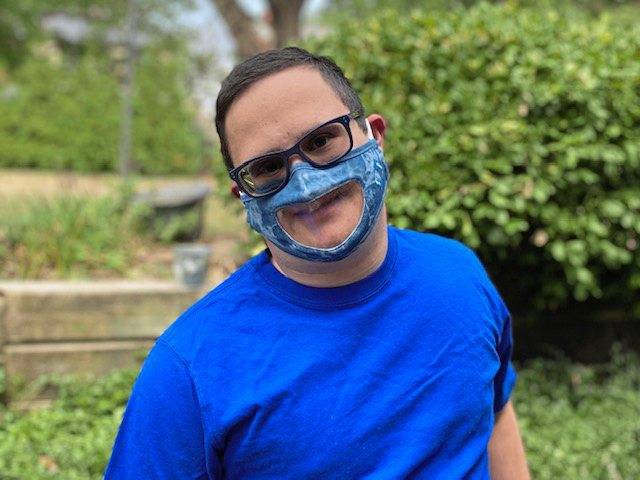Face masks are tools proven to quell the spread of covid-19. But for those who rely on lip reading or have trouble observing social cues, traditional masks can also block their ability to communicate with others.
At Squirrel Hill’s The Friendship Circle, breaking down barriers for the differently-abled is exactly what founders and directors Rabbi Mordy Rudolph and Rivkee Rudolph, his wife, aim to do. Since April, they’ve worked on sourcing their own “clear masks,” or ones that reveal the mouth and chin of the wearer, to aid those with communication disorders.
Working with a Brooklyn yarmulke designer, iKippah, and through the donations of longtime Friendship Circle supporters, the organization distributed clear masks to all of its members by mid-August. They’re also available on the Friendship Circle website in a number of colors and patterns for $10 each, all of which goes back into the organization.
“I spend most of my day thinking about how to make sure everyone in the community is included, and it never occurred to me that masks would become such a barrier for people who already face barriers in communication,” said Rivkee Rudolph.
Used worldwide, the original Friendship Circle model seeks to serve the Jewish community by pairing high school students with younger, special-needs children. Each branch operates independently, and Pittsburgh’s Friendship Circle welcomes children and young adults of all religions and abilities to participate in socialization-promoting programs.
Once the Rudolphs realized what a hindrance traditional cloth masks can be to the very socialization they hope to foster, finding an alternative became a mission.
A Google search brought Rivkee Rudolph to a story about an Eastern Kentucky University student and a crowdfunded campaign to create clear masks for the hard-of-hearing community. Almost simultaneously, a longtime Friendship Circle supporter and fellow Squirrel Hill resident, Marc Tobias, offered to donate 1,000 face masks to the organization.
Though thrilled with his offer, the Rudolphs had one requirement: The masks had to be clear.
Tobias, an investigative attorney and physical security specialist, solves puzzles for a living, and this was just another puzzle. “I got to thinking, there’s no difference between a yarmulke and a mask, except how you wear it,” he said.
The designers at iKippah, whose part-owner has known Rabbi Rudolph since they were teenagers, were happy to delve into mask-making. To date, they’ve sold over 5,000 masks through their own website.
The clear-mask initiative benefits many, like Friendship Circle parent Lisa Silverman and her 20-year-old son, Ryan, who struggles to pick up on social cues.
“For any accommodations, ultimately there’s something we all benefit from,” said Lisa Silverman. “For us, the best result of wearing the masks is that hopefully other people will see them and decide that they would like to have them. The greatest benefit is having the community wear them so the folks who need to understand facial expressions can see them.”
That sort of contagious enlightenment is exactly what Rivkee Rudolph hopes to achieve.
“You never know who’s around you,” she said. “You can say, ‘I’m running some errands; I’m not going to engage with someone who’s hard of hearing,’ but that’s the idea of thinking of everyone all the time: You never really know who needs these accommodations, which is why universal design is so important.”
The pandemic has placed The Friendship Circle’s creativity on full display. They held a drive-though carnival, or “a reverse parade,” through Schenley Park with entertainers and games placed sporadically through a 30-minute driving loop. They’ve organized drive-in movies where kids were assigned to “texting groups” that promoted socialization and movie discussion.
For Rabbi Rudolph, those innovations are the silver lining of this challenging situation.
“Obviously, we all hope for a switch where we can just turn it on and go back to in-person programming and things of that nature, but while we’re here, we kind of want to appreciate some of the things we’ve been learning along the way.”








